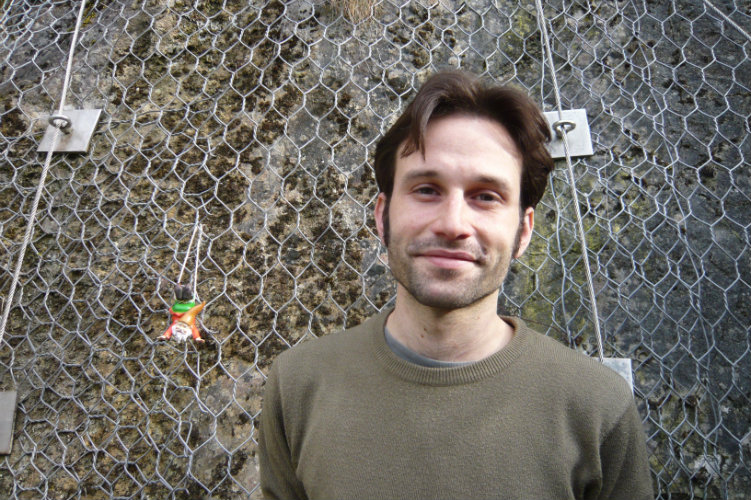Book review | The Proverb Zoo by Armel Dagorn
“Everyone was so damn lonely. Everyone, no matter how hard they tried to ignore it,” says the narrator of “Out-of-town Harry”, by way of introduction to the world. With an opening sentence like that, one could expect Armel Dagorn’s debut short story collection, The Proverb Zoo, to be a leaden exploration of interior sadness. Instead it is a raucous, funny and constantly surprising set of tales populated with socialist dogs, obsessive children, miraculously animated statuettes of the Virgin Mary, elderly piano tuners and shipwrecked loners.
Though originally from France, Dagorn spent many years living in Cork, and adopted English as his preferred language of storytelling. He brings a Nabokovian love of a second tongue and a perspective that feels fresh and distinct from Irish, Anglo or American voices.
The Proverb Zoo is the first story collection to be published by The Dreadful Press, the new publishing arm of the Penny Dreadful magazine, itself a relatively recent entry into the Irish literary mag scene. This is Dagorn’s first published book, though most of the stories have been published already, in outlets as prestigious as Tin House and The Singing Fly.

The stories vary substantially in length; the shortest are barely more than snapshots or intellectual exercises a few pages long. These have varying degrees of success. “The last minutes of BA Flight 465” concerns an unlikely terrorist plot that, while imaginative, is too whimsical to have much of a kick. “Two happy endings and an old one” on the other hand, manages three separate perspectives with a taut, singular purpose, and refuses the obvious ending. Dagorn flits between genre, from romance to sci-fi to historical fiction with curiosity and ease, in the manner of Ken Liu’s multi-award winning The Paper Menagerie. This genre-hopping never feels like a gimmick, always a good faith attempt to tell the story in the form that fits the themes inside.
Many of the stories have a continental feel, in setting or tone. “Return to Aragón” concerns a man who becomes obsessed with Spain after an ordinary package holiday, eventually leaving his wife and family to settle there. “The brotherhood of Wednesday afternoons”, a sketch of latchkey kids playing at adulthood in a furniture store, reads like Italo Calvino visiting the IKEA in Ballymun. There is also an obvious influence from George Saunders on several stories, most notably “Life here’s no different”, a desert island farce where social hierarchies reassert themselves far from civilisation.
“All those lost Edens”, the longest and most ambitious story in the collection, is a scorched western, set in 1840s Mexico. Three unfortunates, led by a malicious drunken field surgeon, go on an impossible search for the President’s leg, amputated on the battlefield years before. It is vibrant and gory and full of lines like raw diamonds, coarse and sparkling. This foray into the borderlands of historical fiction hints at the possibility of a novel from the author.

Dagorn consistently refuses to write misery for its own sake. He has little interest in torturing his characters for nihilistic life lessons. Instead the stories feel genuinely open-ended, with the full spectrum of joy and despair on display. “Nora and Anthony”, a low-key reimagining of The Phantom of the Opera, allows its heroes a measure of triumph over evil, or at least over middle management. The Proverb Zoo doesn’t shy away from sadness, but its melancholy moments are earned. One of the most moving stories, “Out of town Harry”, imagines a world after collapse, of quiet, empty streets. The narrator works as a ‘tuner’, someone who gives corpses a grotesque form of reanimation, to alleviate some of their family’s grief. The sci-fi latticework is cleverly fashioned, but just a frame for a memory story about the betrayal of friendship, a long, long time ago. The sadness is rooted not in blank depression, but in a profound sense of something lost, a time of rhythm, melody and joy.
The collection swirls with religious themes; characters are mistaken for missionaries, have relationships fracture over religion and gaze into the stars in search of deeper meaning. The narrator of “A repeat offence of meekness” accidentally passes himself off as devout to an extremely Catholic neighbour, much to the disgust of his girlfriend. In “Tiny Miracles”, a thumb-sized figurine of the Virgin Mary comes to life for just long enough to make one divine appearance. The working title of the collection was Eternal Dreamers of Greener Grass, a name that gives some indication of the frustration and ecstasy of its inhabitants. The titular story itself concerns a young isolated boy who deals with successive boyfriends of his mother by retreating into an obsession with photographic puns. When one of these men suggests the biblical story of Jonah and the whale, it’s a moment of inspiration for the kid and the end of the relationship for the mother. Dagorn wonders less about the nature of God, and more about how faith itself warps and changes human interaction. The narrator of “All those lost Edens” sees the almighty out in the Badlands as, “not a God of Right and Wrong but One of accidents and happenstance”.
“The idiot of Kildare Village”, the book’s ambiguous closing act, tells the story of a feckless college graduate trying to find his first job in the ersatz town of Kildare Village. It is told first in a series of what seem to be police interviews, before breaking into lush prose poetry. The combination gives the impression that something terrible awaits at the conclusion. When that awfulness never arrives, something far stranger takes its place; a mystical moment of connection, with others and with the land itself. There is a certain safety in an unhappy ending, after all, and very little is playing it safe in this collection.

